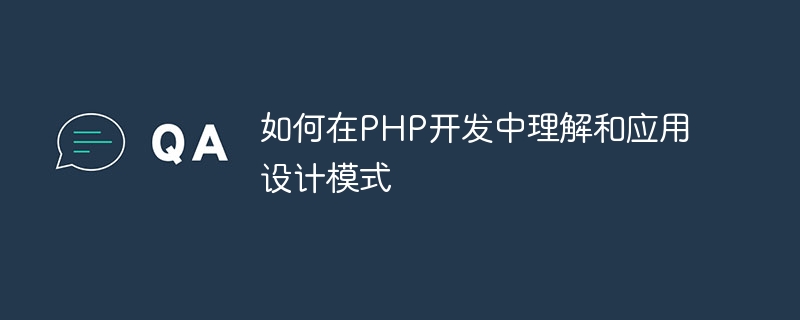Home >Backend Development >PHP Tutorial >How to understand and apply design patterns in PHP development
How to understand and apply design patterns in PHP development
- WBOYWBOYWBOYWBOYWBOYWBOYWBOYWBOYWBOYWBOYWBOYWBOYWBOriginal
- 2023-09-11 09:31:411296browse

How to understand and apply design patterns in PHP development
Introduction:
Design patterns are a problem-solving solution widely used in software development. Design patterns play a role in standardized problem solving in software development and can improve code reusability, maintainability and scalability. In PHP development, design patterns are also widely used. This article will introduce several common design patterns and explain how to understand and apply these design patterns in PHP development.
1. Overview of Design Patterns
Design patterns are a set of experience summaries for solving common problems. It provides a general solution that can be reused in different situations. Design patterns can be divided into three major categories: creational patterns, structural patterns and behavioral patterns. Among them, the creational pattern focuses on the creation process of objects, the structural pattern focuses on the organizational relationships between objects, and the behavioral pattern focuses on the interaction between objects.
2. Singleton mode
The singleton mode is a creation mode, which ensures that a class has only one instance and provides a global access point. In PHP development, the singleton pattern is often used to manage shared resources or configuration information. For example, a database connection class can use the singleton pattern to ensure that there is only one database connection object and provide it for other classes to use. In PHP, the singleton pattern can be implemented using static variables and static methods.
3. Factory pattern
The factory pattern is a creational pattern, which is used to decouple the process of creating objects and the process of using objects. In PHP development, the factory pattern is often used to create complex objects or collections of objects. For example, a user management system can use the factory pattern to create user objects. In PHP, the implementation of the factory pattern can use static methods or abstract factory classes.
4. Observer Pattern
The Observer pattern is a behavioral pattern that defines a one-to-many dependency relationship between objects. When an object's state changes, all its dependent objects are notified and automatically updated. In PHP development, the observer pattern is often used to implement event-driven programming models. For example, an email sending service can use the observer pattern to notify all subscribers of an email. In PHP, the observer pattern can be implemented using interfaces and abstract classes.
5. Adapter pattern
The adapter pattern is a structural pattern that allows the interface of one class to be converted into the interface of another class. The adapter pattern is often used to convert objects between incompatible interfaces. For example, a class that uses the MySQL database can use the adapter pattern to adapt an interface that uses the Redis database. In PHP, the adapter pattern can be implemented using a combination of interfaces and classes.
6. MVC pattern
MVC pattern is a structural pattern that divides an application into three independent components: model, view and controller. The model is responsible for data processing, the view is responsible for data display, and the controller is responsible for connecting the model and view. The MVC pattern can make code more organized, easier to maintain and expand. In PHP development, the MVC pattern is often used to build web applications. For example, the Laravel framework is a classic MVC framework.
7. Summary
In PHP development, design pattern is an important programming concept that can provide flexible, scalable and reusable code solutions. This article introduces several common design patterns and explains how to understand and apply these design patterns in PHP development. Of course, design patterns are not omnipotent, and developers need to choose appropriate design patterns based on specific application scenarios. By understanding and applying design patterns, you can improve development efficiency and code quality to better meet user needs.
The above is the detailed content of How to understand and apply design patterns in PHP development. For more information, please follow other related articles on the PHP Chinese website!

